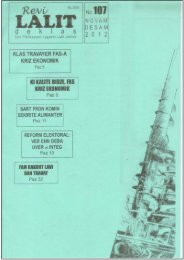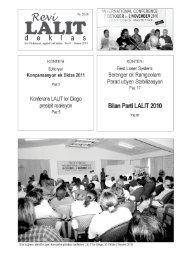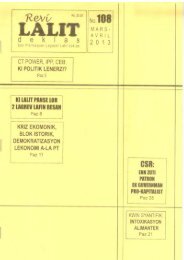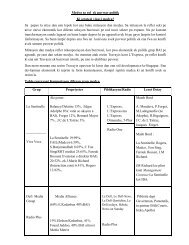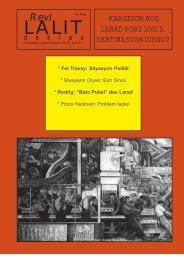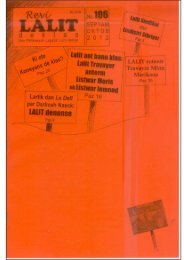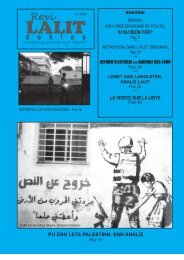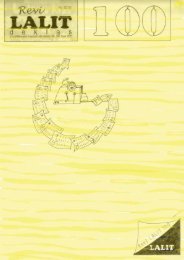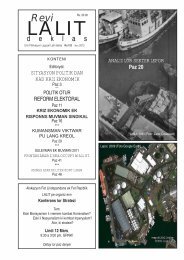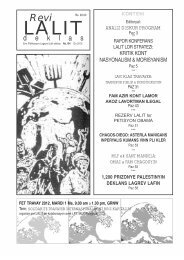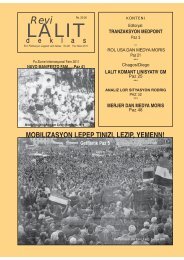Against communalism of the best-loser system - Lalit Mauritius
Against communalism of the best-loser system - Lalit Mauritius
Against communalism of the best-loser system - Lalit Mauritius
Create successful ePaper yourself
Turn your PDF publications into a flip-book with our unique Google optimized e-Paper software.
Name, religion, mo<strong>the</strong>r tongue, birth place and nationality (which I presume to be <strong>the</strong> place <strong>of</strong> origin <strong>of</strong><br />
<strong>the</strong> ancestors) [The 1952 Census Report]<br />
The Report added -<br />
“It should hardly be necessary to add that no single one <strong>of</strong> <strong>the</strong>se criteria was by itself<br />
deemed to be sufficient evidence <strong>of</strong> <strong>the</strong> ethnical character <strong>of</strong> a person, it was; as a rule, <strong>the</strong><br />
cosideration <strong>of</strong> a number <strong>of</strong> <strong>the</strong>se in conjunction which decided <strong>of</strong> <strong>the</strong> classification.”<br />
Due to <strong>the</strong> attitude adopted by <strong>the</strong> Respondents in <strong>the</strong> present case and <strong>the</strong>ir refusal to answer questions it<br />
has not been possible to determine whe<strong>the</strong>r by <strong>the</strong>ir way <strong>of</strong> life <strong>the</strong>y fall within <strong>the</strong> Hindu, Muslim or<br />
Sino-Mauritian communities. They said <strong>the</strong>y belong to a Mauritian community. When questioned about<br />
<strong>the</strong>ir way <strong>of</strong> life most <strong>of</strong> <strong>the</strong> Respondents have stated that <strong>the</strong>y live as o<strong>the</strong>r Mauritians do. They do not<br />
find that <strong>the</strong>y are different. Their names do not mean anything to <strong>the</strong>m because <strong>the</strong>y did not choose <strong>the</strong>m,<br />
<strong>the</strong>se were attributed to <strong>the</strong>m by <strong>the</strong>ir parents at <strong>the</strong> time <strong>the</strong>y were born.<br />
When examined by Counsel for <strong>the</strong> Applicant on <strong>the</strong>ir religious beliefs, <strong>the</strong> Respondents concerned have<br />
consistently refused to give details. I note here that Counsel lay more emphasis on religion when<br />
questioning <strong>the</strong>m about <strong>the</strong>ir way <strong>of</strong> life.<br />
Counsel for <strong>the</strong> Respondents has maintained that <strong>the</strong> burden <strong>of</strong> pro<strong>of</strong> lay upon <strong>the</strong> Applicant to prove to<br />
which community <strong>the</strong> Respondents belonged if Applicant was challenging <strong>the</strong> correctness <strong>of</strong> <strong>the</strong>ir<br />
declaration. First I find that Applicant had made out a prima facie case by relying on <strong>the</strong> names <strong>of</strong><br />
Respondents. He had not yet made out his case on a balance <strong>of</strong> probabilities, but he had also alleged that<br />
Respondents have made false declarations. I am <strong>of</strong> <strong>the</strong> view that Respondents could not sit back and not<br />
file affidavits. They had to join issue with Applicant. This is not an ordinary civil case. It is a<br />
Constitutional matter where Respondents have to meet <strong>the</strong> case entered against <strong>the</strong>m. The evidential<br />
burden also shifts on <strong>the</strong>m to prove that <strong>the</strong>y have been acting in good faith and to explain <strong>the</strong> reasons for<br />
<strong>the</strong>ir action. It was not sufficient to elicit explanations from <strong>the</strong>m only when <strong>the</strong>y were submitted to<br />
examination on personal answers. Applicant also contended that he has known Respondent No. 17, Ms.<br />
Minerve, as a member <strong>of</strong> <strong>the</strong> Assembly for a long time and has never known her to be a Hindu.<br />
Fur<strong>the</strong>r <strong>the</strong> Electoral Commissioner was called to produce <strong>the</strong> nomination forms <strong>of</strong> <strong>the</strong> Respondents who<br />
had been candidates in previous general elections. In 1995 Respondent No. 17 had declared that she was<br />
from <strong>the</strong> General Population. Respondent No. 12 (now declared as Muslim) had in 1983 declared that he<br />
was a Muslim whereas he declared his community to be Hindu in 1987. Respondent No. 6, Alain Ah Vee,<br />
(now declared as Hindu) had in 1987 declared himself to be a Hindu. This consistency was only a matter<br />
<strong>of</strong> chance as it was <strong>the</strong> result <strong>of</strong> <strong>the</strong> drawing <strong>of</strong> lots. As for Respondent No. 17 she claimed that in 1995<br />
her party had imposed it on her to declare her community, which admittedly <strong>the</strong>refore is <strong>the</strong> General<br />
Population.<br />
Even if one were to apply <strong>the</strong> criteria used for ethnical classification in previous census forms, for<br />
example, name, religion, mo<strong>the</strong>r tongue it would be difficult to determine <strong>the</strong> correction <strong>of</strong> <strong>the</strong> declaralion<br />
relating to Respondents' community. As I have said, way <strong>of</strong> life can now be a Mauritian way <strong>of</strong> life.<br />
Names can be a helpful indication. Many Muslim and Hindu names are actually Hindi or Urdu words that<br />
have a specific meaning or connotation. For example Ram is <strong>the</strong> name <strong>of</strong> a Hindu deity, <strong>the</strong> hero <strong>of</strong> <strong>the</strong><br />
Ramayana. Similarly Christian names are <strong>of</strong>ten <strong>the</strong> names <strong>of</strong> saints in <strong>the</strong> Christian calendar. Chinese<br />
names also have significance. But names by <strong>the</strong>mselves, although <strong>the</strong>y may <strong>of</strong>fer a primary indication <strong>of</strong><br />
<strong>the</strong> way <strong>of</strong> life <strong>of</strong> a person, are not a determing factor.<br />
As early as 1881 (paragraph 31 <strong>of</strong> <strong>the</strong> Census Report <strong>of</strong> 1881 which is <strong>the</strong> earliest available at <strong>the</strong> Central<br />
Statistical Office) difficulties regarding proper classification <strong>of</strong> population were envisaged when many<br />
members <strong>of</strong> what was called <strong>the</strong> Indian population were christened and adopted christian names.<br />
Religion does not determine community and <strong>the</strong> Respondents refused to discuss <strong>the</strong>ir religion. Their<br />
religious practices would have given a clue as to <strong>the</strong>ir way <strong>of</strong> life. Counsel for <strong>the</strong> Applicant, relying on<br />
one <strong>of</strong> <strong>the</strong> dictionary meanings <strong>of</strong> “community”, stated that “community” is a body <strong>of</strong> people having a<br />
religion in common (Concise Oxford Dictionary 9th Edition). He also called evidence to show that people<br />
from <strong>the</strong> Muslim community must practice Islam. But he also faced a difficulty in that some Muslims do<br />
not consider Ahmadis to be Muslims. This shows that it may not always be acceptable to equate<br />
community with religion. Those Respondents who declared <strong>the</strong>mselves to be Muslims refused to answer<br />
whe<strong>the</strong>r <strong>the</strong>y practised <strong>the</strong> Islamic faith. But it was also clear that <strong>the</strong>y had declared <strong>the</strong>mselves to be<br />
Muslims as a result <strong>of</strong> <strong>the</strong> drawing <strong>of</strong> lots.<br />
Finally, nowadays mo<strong>the</strong>r tongue or linguistic group is not very helpful to determine somebody's way <strong>of</strong><br />
life. The 1962 Census Form contained <strong>the</strong> following printed instructions -<br />
“Mo<strong>the</strong>r tongue is <strong>the</strong> language spoken by <strong>the</strong> forefa<strong>the</strong>rs <strong>of</strong> <strong>the</strong> Respondent, <strong>the</strong> language<br />
that has been spoken in his home when he was a young child. It makes no difference if <strong>the</strong><br />
Respondent does not speak that language now or if he has never spoken it”.<br />
The latest Census form (GN 57 <strong>of</strong> 2000) required a person to state <strong>the</strong> language spoken by his ancestors<br />
under “Linguistic Group”. The Census Guide and Instructions stated that it did not matter whe<strong>the</strong>r <strong>the</strong><br />
person speaks <strong>the</strong> language or not. A person was also required to state <strong>the</strong> language usually or most <strong>of</strong>ten<br />
spoken by <strong>the</strong> person in his home. Again no information could be obtained from <strong>the</strong> Respondents on this<br />
score and <strong>the</strong>y refused that <strong>the</strong> particulars on <strong>the</strong>ir census form be disclosed. They could not be compelled<br />
to answer questions.



